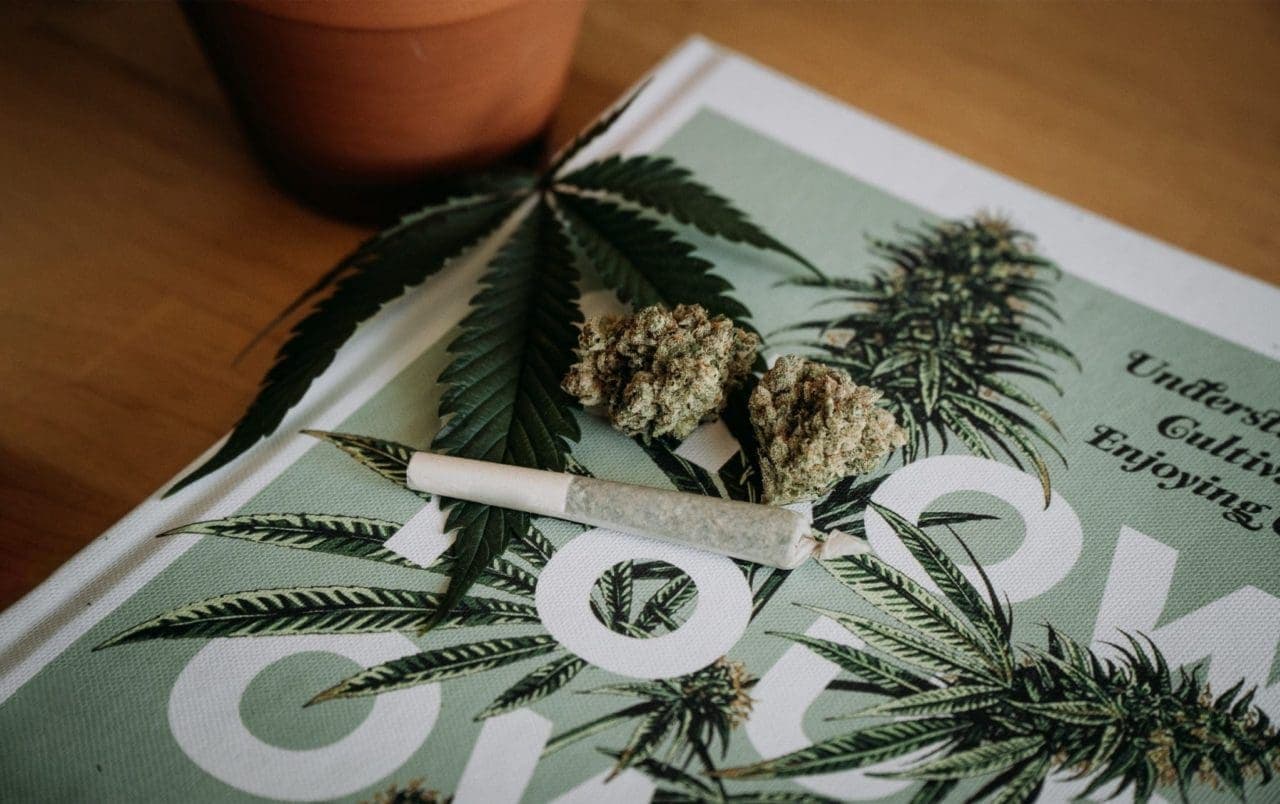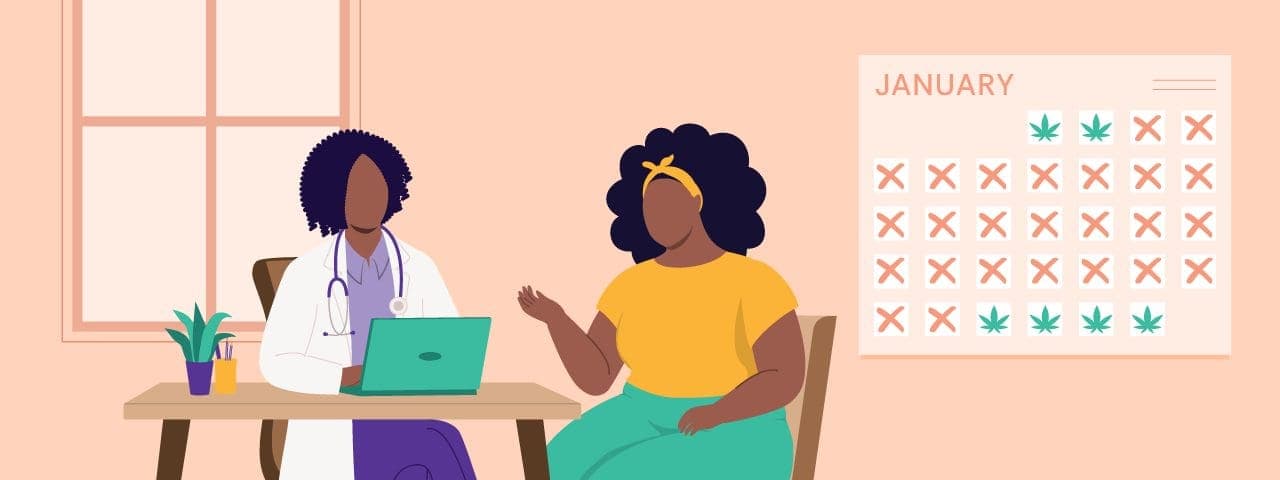Can you develop a tolerance to cannabis?

Article written by

April AcernoContent Writer
Content reviewed by

Chris Wood PharmDMedical Reviewer
Cannabis tolerance occurs when your body becomes less responsive to the plant’s effects. This usually happens after frequent or prolonged use. As a result, you may need higher doses to achieve the same therapeutic benefits.
Learn why cannabis tolerance develops and how to lower your tolerance.
Get your medical marijuana card
Do you build a tolerance to weed?
Most of the effects you feel after using cannabis come from compounds called cannabinoids interacting with your body’s endocannabinoid system. This system includes cannabinoid receptors found throughout your body.
Over time, frequent or prolonged cannabis use can cause these receptors to become less responsive. This is a sign of tolerance.
When you build tolerance to cannabis, your typical cannabis doses may feel less effective and you may need to consume more to achieve the same results.
Tolerance to THC
Studies on cannabis tolerance mostly focus on tetrahydrocannabinol (THC), the main cannabinoid found in the cannabis plant.
According to a research review, it’s possible to develop a tolerance to the effects of THC, including its intoxicating effects. This happens because frequent, long-term use can cause changes in the brain’s cannabinoid receptors.
Over time, these receptors may become less responsive or decrease in number, making cannabinoids like THC feel less effective. In most cases, these changes can be reversed if you reduce or stop using THC.
Maintaining a consistent, low THC dose may also slow the development of a tolerance, while high doses may increase your tolerance more quickly, according to the review authors.
Overall, more research in humans is needed to fully understand how dosing patterns impact tolerance to cannabinoids.
Tolerance to CBD
Cannabidiol (CBD) is a nonintoxicating cannabinoid in cannabis that may offer some health benefits. It interacts with different receptors in your body than THC.
Current scientific evidence isn’t conclusive on whether you can develop a tolerance to CBD. Research on this topic is limited, and findings so far are mixed.
Pros and cons of cannabis tolerance
Building a tolerance to cannabis can have potential benefits as well as drawbacks.
Potential benefits of building a tolerance include:
- Lower risk of side effects: Developing a moderate cannabis tolerance can lower your risk of certain side effects, such as drowsiness, anxiety, or paranoia. Still, some people experience these even with increased tolerance.
- Fewer changes to behavior and brain function: One review of studies found that frequent cannabis users tend to experience fewer cognitive and behavioral changes while intoxicated compared to occasional users.
- Ability to use a wider range of products: If you have an elevated cannabis tolerance, you may be able to try high-potency products, such as concentrates.
Note that there is no guarantee that developing a tolerance will benefit you. It’s not recommended to increase your dose of cannabis in an effort to achieve these benefits.
Potential drawbacks of building a tolerance include:
- Increased costs: A higher cannabis tolerance often means needing a larger dose to achieve the same benefits or effects. This can lead to spending more money on cannabis products.
- Potential negative health effects: Consuming large amounts of cannabis over time may increase the risk of certain health issues, such as cannabis hyperemesis syndrome, a condition involving severe and persistent nausea and vomiting.
- Increased risk of dependence: People with a high cannabis tolerance are more likely to develop a dependence on cannabis, known as cannabis use disorder.
What is considered a high tolerance for weed?
There’s no single standard for a high cannabis tolerance. Tolerance is subjective and can change over time depending on your usage patterns, overall health, and other factors.
That said, if you no longer experience the therapeutic effects of cannabis at your usual dosage or continually increase the amount of THC you consume, you may start to develop a relatively high tolerance.
Weed tolerance chart

There’s no exact way to measure cannabis or THC tolerance, but Leafwell’s cannabis tolerance chart provides general guidance on determining yours:
- No tolerance: People who have never used or are just starting to use cannabis fall into this category. Low doses of THC will lead to therapeutic and potentially intoxicating effects.
- Low to medium tolerance: With safe and controlled dosing, cannabis tolerance typically stabilizes at this level.
- High tolerance: With higher doses of THC, tolerance can build to levels where increasingly larger doses are needed to experience therapeutic benefits.
- Full tolerance: Some individuals develop full tolerance to THC, meaning they don’t feel any effects regardless of the dose.
Is it possible to have a naturally high weed tolerance?
It’s unclear whether you can have a naturally high tolerance to cannabis.
Research suggests that individual differences in the endocannabinoid system may affect how sensitive one person is to THC compared to another.
Factors such as age, weight, sex, or health status may influence an individual’s natural tolerance to cannabis.
How long does weed tolerance last?
Cannabis tolerance lasts until you reduce your dosage or stop using cannabis.
It can take months to safely reset your tolerance using consistent, gradual dose decreases.
Ultimately, the amount of time it takes to lower your tolerance will depend on your dosage and frequency of use.
How to lower weed tolerance
One way to reduce cannabis tolerance is by taking a tolerance break or “T-break.” This involves completely abstaining from cannabis use for a short period — usually a few weeks.
If you use medical cannabis to manage a health condition, a full tolerance break may not be recommended, as it can interfere with your treatment.
In this case, try slowly lowering your dosage under your doctor’s supervision instead. This process can help you reset your tolerance while still allowing you to manage your symptoms.
The bottom line: Cannabis tolerance develops after frequent, prolonged use
Using cannabis frequently or over a long period of time can lead to tolerance.
Developing a high tolerance can mean needing a higher dose to experience the same therapeutic effects, spending more money on cannabis products over time, and experiencing certain negative health effects.
If you use medical cannabis, speak with your doctor or a Leafwell provider about strategies for lowering your cannabis tolerance. They can help you reduce your dose while still continuing treatment.
It’s always best to consult a healthcare provider before changing your medical cannabis routine, especially if you take medications.
Get your medical marijuana card
Frequently asked questions
Continue reading to learn more about cannabis tolerance.


